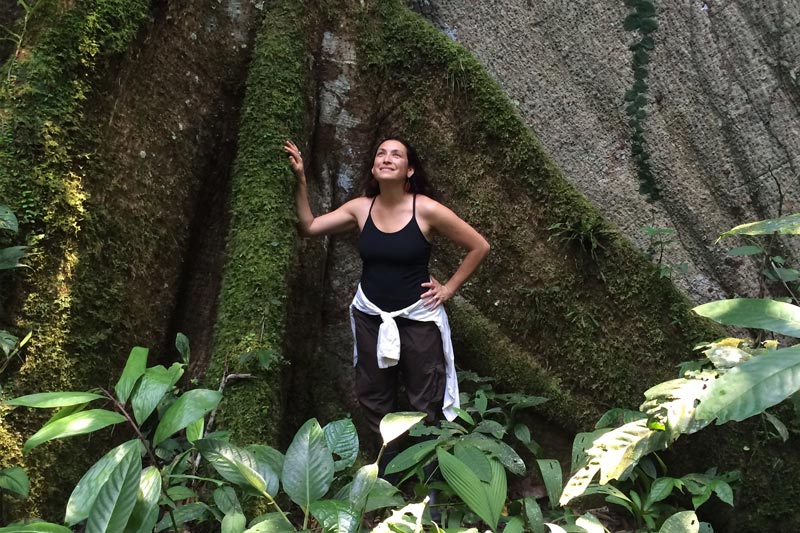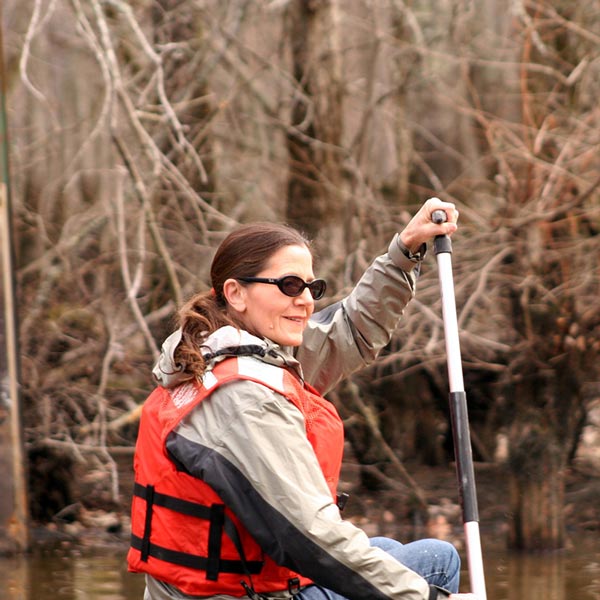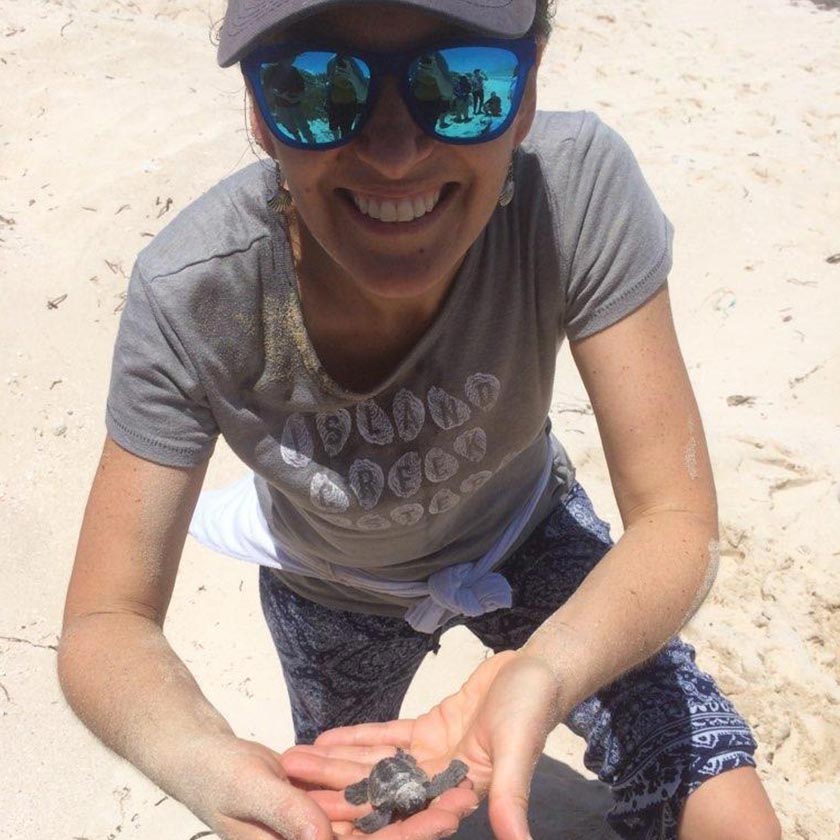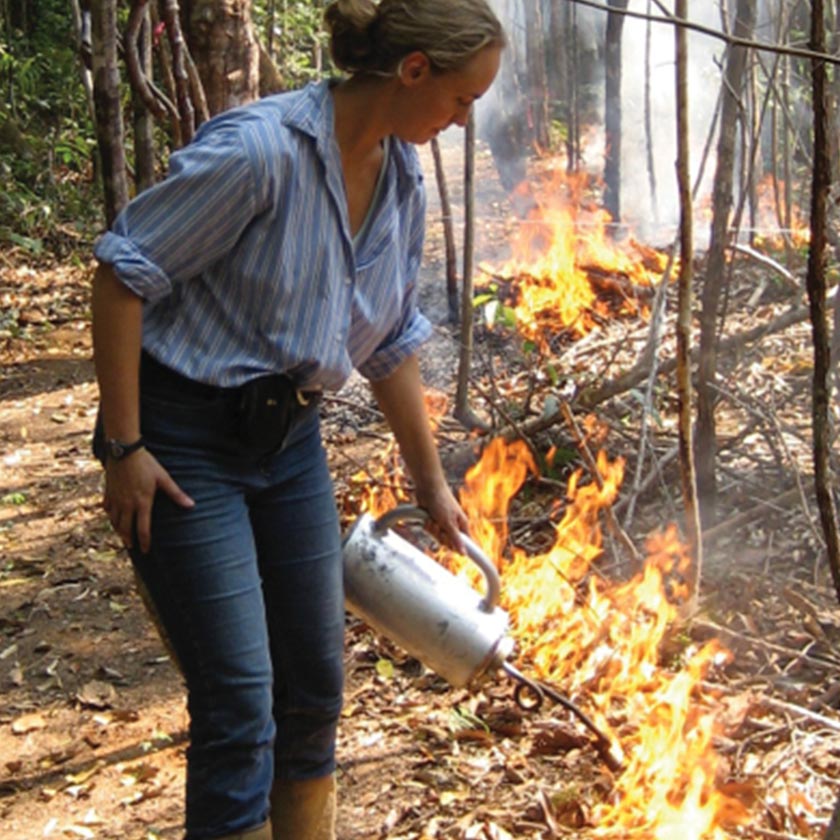
Leila Salzar-Lopez with kapok tree in South America. Photo: Courtesy Salazar-Lopez.
Lelia Salazar-Lopez applies both the Environmental Studies and Political Science of her UCSB degree to Protect the Amazon.
Today, Leila Salazar-Lopez BA ’98 is Executive Director of Amazon Watch, an Oakland, California- based international organization founded in 1996 “to protect the rainforest and advance the rights of indigenous peoples in the Amazon basin.” As a student at UCSB, she majored in Environmental Studies and Political Science in the groundbreaking Environmental Studies (ES) program. She is the recipient of the ES 50 Year Anniversary Alumni Award. Here is her story.
In the fall of 1993, my mother drove me from Oceanside to Santa Barbara to begin my freshman year at UCSB. I grew up by the ocean and spent my summers at the beach until the beach was closed one summer due to a medical waste spill. That was my first “shocker” moment that was the foundation of me becoming an activist. I remember seeing the oil platforms in the ocean and getting tar on my feet at the beach, but it wasn’t until I started taking ES classes that I learned about the 1969 oil spill and the impact it had and would have on the community, the country and the world.
The 1969 oil spill was a “shocker” for the people of Santa Barbara County. The images of oil on the beach and wildlife covered in oil required immediate and precautionary action unlike anything seen before. 21 faculty at UCSB joined together to form the Environmental Studies Program, an interdisciplinary program including natural sciences, social sciences, political science, environmental law, economics, planning, communications and more. Considering the urgency, it was welcomed by the University and community to become the first Environmental Studies Program in the world that would inspire similar programs across the country and world.
Upon considering where to pursue my higher education, I wanted to attend an institution where I could share my passion for the environment and changing the world. I chose UCSB to pursue dual majors in Environmental Studies and Political Science and because of its history of activism.
The interdisciplinary approach of the program is the greatest strength of the ES Program, as it creates an opportunity for students to be introduced to a variety of disciplines from faculty and guest lecturers. In addition to the classes, I am indebted to the requirement for an internship, as it led me to visit the Amazon rainforest as a volunteer at the Jatun Sacha Biological Station in Ecuador in the summer of 1995. Since seeing a slide-show in high school about the Amazon, I knew that I would go there one day. So, when Eric Zimmerman asked me to think about an internship, I knew right away that I wanted to volunteer in the Amazon. I wanted to plant trees and learn about ethnobotany. I did, but I also learned about the devastating impacts of oil development in the Amazon. I learned that Texaco, now Chevron, drilled and dumped billions of gallons of toxic oil waste into the Ecuadorian Amazon and I vowed to dedicate my life to seek justice for the forest and communities harmed by this.
While I enjoyed most of my classes in the ES program, one that really stood out was the symposium with Marc McGinnis where we were all given a role at a hearing for a proposal for a big-box development project on a wetland in Goleta. The roles included activists, lawyers, coastal commissioners, local leaders, developers, lobbyists [and] journalists. I forced myself to take the role of the lobbyist to better understand their position. It was uncomfortable, but it taught me a lot about money and power in politics. The project failed in our class, but lost in reality. It is the Costco shopping center at Storke and Hollister.
Our planet is on fire from California to the Amazon. We are facing a climate emergency that requires immediate and urgent action to keep fossil fuels in the ground and make a just transition to a renewable energy economy. We have the technology and the solutions, we have the people demanding change, but we do not have the political will required for the massive shift and transformation to truly protect people and the planet. Indigenous and frontline communities, youth and women are at the forefront of the problems and the solutions and we need to stand with them in demanding climate justice.
While at UCSB, we learned the history of the environmental movement, the establishment of protected areas, laws to protect the environment, [and] much more.
Now, the UCSB ES Program has a focus on climate justice which not only broadens the curriculum of the program, but the diversity of the students. I was very happy to see more youth of color from communities impacted by refineries or industrial agribusiness in the program who are now graduating, giving back to their communities and becoming leading voices in the climate justice movement.
Since 2015, I have served as the Executive Director of Amazon Watch, based in Oakland, CA. I joined the organization in 2002 as a campaigner on the Chevron: Clean Up Ecuador Campaign and in 2010 became the Program Director. As ED, I lead the organization in our work to protect and defend the bio-cultural and climate integrity of the Amazon rainforest by advancing indigenous peoples’ rights, territories, and solutions, including solar for energy, communications and transport in the Amazon.
Honestly, I am constantly referring to my 5 years as a student and activist at UCSB in my work. I am indebted to my education experience -inside and outside of the classroom- to give me the foundation to do my current work.


